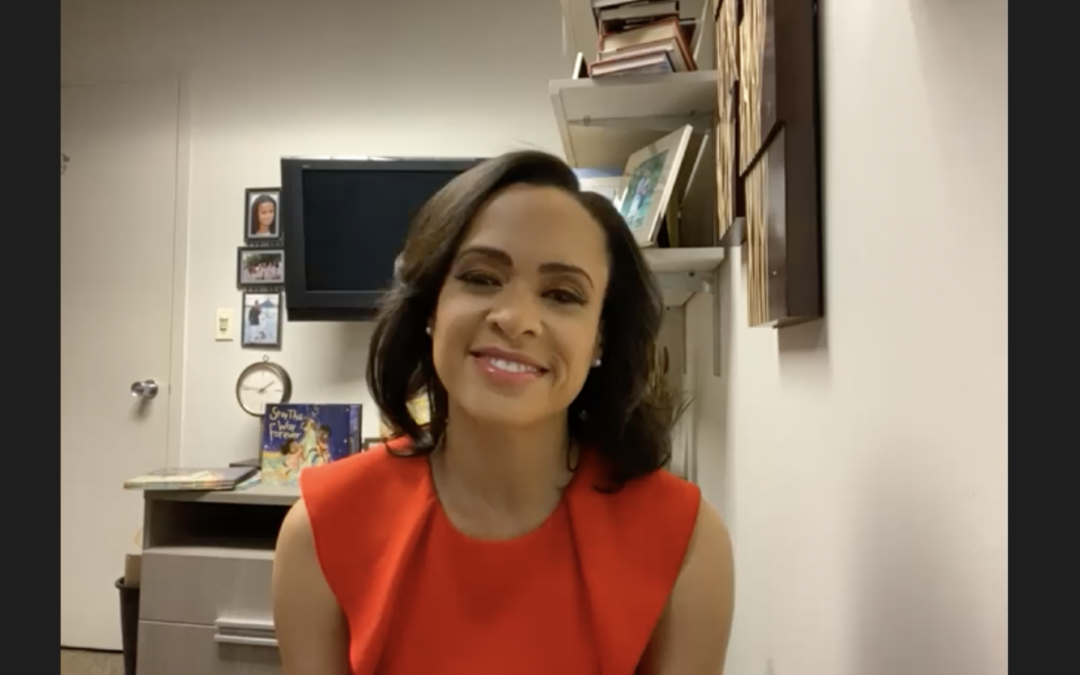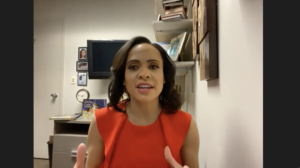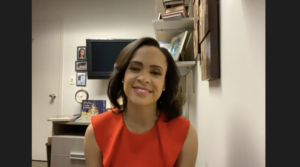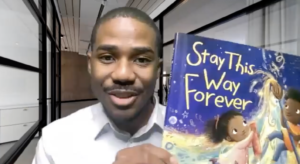
Stay This Way Forever-An Interview with Linsey Davis
 As parents or adults with young children in our lives it can often feel like our children’s childhoods are flying by and we want to capture moments and memories as we are experiencing them. We must find intentional balance in how to instill wisdom in the next generation while nurturing creativity and innocence that life can often be challenged as we grow older. UrbanFaith interviewed Linsey Davis, Emmy award winning journalist and children’s book author about her newest book Stay This Way Forever which captures moments of the joys and challenges of kids growing up. The full interview is linked above with excerpts below which have been edited for clarity.
As parents or adults with young children in our lives it can often feel like our children’s childhoods are flying by and we want to capture moments and memories as we are experiencing them. We must find intentional balance in how to instill wisdom in the next generation while nurturing creativity and innocence that life can often be challenged as we grow older. UrbanFaith interviewed Linsey Davis, Emmy award winning journalist and children’s book author about her newest book Stay This Way Forever which captures moments of the joys and challenges of kids growing up. The full interview is linked above with excerpts below which have been edited for clarity.
Allen
Welcome to UrbanFaith. We are so glad to have Linsey Davis with us today. She is an amazing Emmy Award-winning news anchor, a mother, and a children’s book author. We are so glad to talk about her book Stay this Way Forever. We will talk about this book and how it’s impacting children, [as well as Linsey’s writing] process. We’re so glad to have you with us today, Linsey. So, my first question for you is, what inspired you to write a children’s book after all of the work that you’ve done in journalism and being successful there? What got you interested in writing a book like this?
Linsey
Well, Allen, like you, I have a seven-year-old. And after he was born, I was reading children’s books to him. And I started thinking, you know, I could do this. And ultimately, that could turned into a should because I started thinking about how intentional and deliberate I had to be to find books with characters who look like my son. A lot of times people think that writing children’s books is such a departure from the news industry. At my core, I really consider myself to be a storyteller. And so it’s really kind of more of the same, except that I get to really tell the good news and focus on positivity, letting my creative juices flow in this way, where[as], my day job is often doom and gloom. So, this is kind of a nice release. Additionally, I felt my son wanted to watch me on TV. [But] quite often with the news, I feel like the themes and the storylines are just too heavy for his young mind. [I want] to try to preserve his innocence as much as I can. And so the book was something that I could 100% share with him. He could really be a part of the process, and ultimately we could read the books together. I could kind of guide the inspiration and what was going into his mind–the things that I wanted to instill in him.
Allen
That makes so much sense. You know, as a father–I’ve got three daughters: seven, five months, and an 11-year-old–and I really relate to the importance of trying to find ways to shape them in positive ways. One of the things you mentioned really sticks out. There’s a lot about creativity there. And then in the beginning of the book, you talked about imagination and trying to encourage that. What are some of the ways that imagination and creativity play a role in the work that you do, or even in writing this?
Linsey
I think being an effective storyteller is all about creative writing and using the language in the most expressive way. My son loves Legos. He likes to kind of create, so we’ll get him a [Lego] set that’s intended to be one thing, and he takes the head from that and the wings from this other thing and comes up with his own creation. And I love that–the idea of thinking outside of the box. Quite often as we become adults, we get kind of pigeon-holed into a certain way of thinking, where for kids, they just are starting from the ground up as far as whatever they can dream they can create and build. I have started being more intentional with my son, and he just got a journal. He had asked me what a diary is. And so I said, “Would you like to kind of write your thoughts down?” He said yes. I think that writing is such a key way for us to express ourselves–whether we’re young or old, or just hoping to remember and hold on to certain moments that we’re going to forget decades from now. We can go back and relive some of those moments and think about how we processed them at the time.
Allen
So that actually gives me a really great segue to another question. I felt like when I was reading this book, I was capturing feelings from raising my girls and from being a child myself, and you did such a good job capturing feelings and memories. Thank you. Were there any particular moments that came to mind for you, or can you talk about some of those memories or feelings that stuck out as you were writing this?

Linsey
So I have a journal, but I do a terrible job at actually keeping up with it and regularly doing entries. So I treated this book as every mom and dad’s thoughts with regard to childhood, and really kind of trying to press the pause button or freeze these moments before they all slip away.
And so yes, in particular, the pitter patter of my son’s feet in the morning before he jumps into bed with us, especially on the weekends. I thought so many times, I’m going to miss this one day when he no longer wants to jump in bed with mom and dad. And with so many of the aspects of childhood, you never know when it’s going to be the last time. When they’re going to cuddle up in your lap and fall asleep or reach for your hand. When you’re walking along, think sometimes they become, you know, too cool. They’re ready to go off with their friends. But for right now, I’m really cherishing this time. And I think that so many parents will really be able to relate, and it’ll kind of resonate with them about this intimacy and this shared time.
Additionally, when my son was falling asleep, he’d want somebody to be in the room. I would keep my phone with me while the lights were out, and I would try and write down different ideas from the day that I just really wanted to keep with me. And one of those nights, he said, “You know what I’m going to do tomorrow?” And he was telling me about how he was gonna have certain ice cream, and he was gonna have this play date, and he said, “It’s gonna be the best day ever!” And I love that idea.
I really hope that no matter if he’s 30, or 50, or 70, the idea of tomorrow is still so pregnant with possibility and excitement for him. I think that when we stop being excited about the future, it’s a detriment for us. And so I’m hoping that so many of these things–his curiosity, his creativity, his excitement–these are the aspects of childhood that I think that he can take with him into adulthood. He doesn’t have to, you know, kind of put away [those with the] childish things. At some point, when he becomes a man, I hope that he’ll take those with him.
Allen
Absolutely. And one of the other things that you mentioned is everything that’s going on in the world. Now we’ve got kids who have just lived through a pandemic and all of this unrest, and there’s uncertainty. I hear my daughter asking, “Why is this happening? What are we supposed to do?” What are some ways that you can encourage your son or help other parents to encourage their kids as they’re seeing and hearing some of this stuff, whether it’s in class or elsewhere? How can we keep encouraging our kids?
Linsey
Well, if you look at studies, kids are so resilient, right? I think that in some ways, while this has been hard for every age range, I think that the kids are going to be the ones who really snap back, the fastest. And that gives me hope. And so in our household, we really try to be hopeful about the different phases of what we’re going through.
It was my son’s birthday at the end of March, right as everything started shutting down in New York. We were supposed to go to Disney for the first time. And then we’re thinking, well, things are going to be better in September. So we replan the trip, but things were not better at all.
It’s been about really focusing on the positives through it. So we’ve talked about how we’ve gotten to have breakfast and lunch together as a family for almost a year, and we were able to really have this quality time that otherwise, we wouldn’t have. Otherwise, my son would be at school, and then I go to work at a later shift. So we really would only see each other on weekends. This has given us this renewed family time. And I think that there are ways in the midst of the toughest of times to find something that kind of sparkles a little bit in the midst of it. We’ve really tried to hold on to that and be intentional about counting our blessings. Because we know that there are people who do have those empty chairs at their tables. We’ve talked to our son about that–both the good and the bad–and what we have to still be so thankful for. The journal that we just got my son is a gratitude journal. Again, a very intentional way to try to focus on the positives.

Allen
Yeah, those daily devotions can be huge. That’s something I’m leaning into. And we’re trying to be more aware of something that else you talked about in the beginning–the lack of images and that need for your son to see characters that look like him. Why is it important for us to have books that speak to children in their context, especially as African Americans? Why, are books like yours important?
Linsey
Sure. You know, there was an essay that I read years ago called Windows, Mirrors, and Sliding Glass Doors. And the point was that for every children’s book to really be effective, it needs to have a mirror so the child can see themselves reflected in the pages. It needs to have a window also so a child can peer into a world that’s perhaps unfamiliar to their own. And if that window is really transformative, it can serve as a way to transport them into that world that may be unfamiliar.
So initially, I was writing this thinking I needed to have black and brown characters for my son so he sees himself. I was really only thinking about the mirror of it. But then as I started kind of having this shift where I was seeing justice as just as important. The book needs to have the windows because of this climate that we continue to be in, even in the midst of the so-called racial reckoning. And there’s been so much talk about how we’re different.
And people often say that kids don’t see color, but I totally disagree with that. Kids do see color–they just don’t assign a value to it. It’s adults who do. It’s learned behavior that the children get from their parents and their environment, people they’re around. And so I think that it’s just as important that I provide those windows.
In many scenarios, parents really need to examine their own bookshelves and see how diverse their book collection is. If you live in an area that doesn’t have a lot of diversity, or if your school or place of worship is not diverse, I always recommend to parents that they start with their toys and their books. That’s an easy way that you can expose your children to a child who doesn’t necessarily look like them.
Quite often we fear what we don’t know. The more that you have a sense of, “Oh, yes, I’ve seen people who are that color before,” or “I’ve seen people who have that belief before that religion,” or whatever it is. My son goes to school or camp or something, when he comes home and has met a new friend, he tells me immediately what they have in common. “They like Legos, just like I do. They like Star Wars, just like I do. We ate popsicles together.” Adults will often think of how we’re different from each other, but kids just are looking at how we’re alike.
That’s why I wrote my second book, celebrating how we are more alike than different. I felt like, let’s just confront it. Yes, our hair is different, our skin is different, our features are different, our beliefs are different. But in the end, God gave us one big heart, that’s the most important part, because that’s where love starts. I think that’s kind of a continuation through all three of my books. It’s very deliberate that on at least one or two of the spreads in each of my books, there’s a group setting. So they’re going to be at a school, in a classroom, or an airport or a block party–we have a lot of different people. So anybody who’s looking at the pages of these books or reading them will see somebody who they can identify with who looks like them, or a family member or relative.
When people talk about diversity and inclusion, I think that they’re not necessarily looking at the big picture, unless you’re including everybody, right? It’s not just about bringing only black and brown people to the table. It’s about bringing Native Americans and Asians. But when I was looking [at this data] seven years ago, more than 90% of the children protagonists in children’s books were white. And meanwhile, if you look at the U.S. Census Bureau, half of the kids in this country are kids of color. Additionally, a 2018 from the University of Wisconsin found that 27% of children’s books have animals as the central character. And so that means that children are more likely to see an animal than children of color in their books. So that’s really a problem. And so rather than complain about it, I figured I’d just be part of the solution and start creating some books that have black and brown characters.
Allen
It’s great. So let’s pivot to the message that you wanted to communicate to children reading this book. My daughter has just started reading in the past couple of years. She’s trying to grasp some of these words, but she looked at your book and she knew what it said. She said, “Stay this way forever.” she could read that out loud, and that stuck out to her right away. What are some of the messages that you want to pass on to kids who are reading this? Maybe new readers or even those who are hearing their parents read?
Linsey
You know, I think that that’s where it’ll be really profound. Hearing your parents or grandparents reading these words, knowing that you’re loved and cherished. I think that there’s something really special and meaningful when somebody tells you, “I love that the way you smile,” or the way you throw your head back when you laugh–not [just that] you love them, but the examples of the ways in which you love and the qualities that you love in a very unconditional way. We go through the book with the very specific aspects of children that again, I think that everybody is going to relate to. Like the belly laughs or the tickle fights or whatever it is that you do in your home, chances are a lot of families are doing the same thing–just going through these different stages of childhood. Mainly, I hope that the children who are reading this or being read to just feel cherished and adored by their loved ones.
Allen
You have a line in there that really touched me. You said [may] your heart would stay open wide, so that love can rush in. Can you talk a little bit about what that may mean? And how we can stay open?
Linsey
Sure. Well, I think that it’s anyone I don’t even think it’s just having a black son. But I do worry about how when he gets older, he could become guarded based on the world’s perceptions of him just because of his skin color. I really don’t want that for him. I really don’t want to have the albatross around his neck and that waiting list that can come along with that. And, and so I’m really hoping that he’ll still love so freely and that he won’t feel that he’s been boxed in.
But I think that any parent can relate to that, whether it’s bullies or whatever we could be ostracized about in our community in a way that we feel that, you know, we don’t measure up or people kind of keep us distant or that we’re not going to be they’re not going to be friends with us for whatever reason, it could be kids have unfortunately so many reasons that they end up kind of guarded and boxing themselves off from the hurt or the pain. And, and so I really am just hoping for as long as he can, that he can really preserve and children in general can can hold on to that idea of just loving it’s kind of like, you know, when people talk about, you know, dancing, like no one’s watching and that kind of thing. Just you know that that freedom that unbridled, just, you know, excitement and wide eye, you know, love of life and joy. That is what I’m really you know, talking about in that in that line, that sense of just loving and being loved and giving it in exchange. He very easily very, in a very fluid way.
Allen
So, my last question. I really appreciated being able to read this. I honestly started to tear up when I got to the end. It’s a beautiful book, and I’m so glad that you wrote it and that I’m able to share it with my daughters. What’s something that you want to leave parents with as we think about how to help our children maintain these qualities of openness to life and love?
Linsey
First of all, just spend quality time with our children. And even in the midst of this turbulent past year, I have tried to be really intentional about going out on dates with my son. Just taking him to lunch and really trying to put the phone down during that time–talking to him about what he’s thinking and what he’s feeling. And I think that whatever it is that we can do, if it’s that reading time, right before bedtime, prayer time, or the mealtime–whatever it is, the time that we’re able to kind of set aside. I think in the same way that kids are resilient, they’re going to remember even though you’re busy, you’re going off to work or you’ve got a hectic schedule on Zoom calls all day, I think that they will be very forgiving if they know that. But at the end of the night, you were there to tuck them in at the end of the day, you were there, at dinner time, and you kind of talked through their day or whatever it is. I would like to think that, but maybe I’m being too optimistic. When I think about my own childhood, I think you’re willing to let a lot of things ride if you felt fulfilled at the end of the day. I think many parents would be surprised about how a little bit can go a long way in the heart and eyes of a child.
Allen
Fantastic. Well, thank you so much for this again. I’m just touched to have Stay This Way Forever and share it with my daughters. My five-month-old loved the pictures. She tried to eat it, but couldn’t. But it’s just a joy. And I thank you so much, Linsey, for sharing with us today and just look forward to continuing these conversations with our children and our audience.


 Flowers, candy, and cards are nice, but for moms, the best Mother’s Day gifts of all are the people who make us mothers.
Flowers, candy, and cards are nice, but for moms, the best Mother’s Day gifts of all are the people who make us mothers.